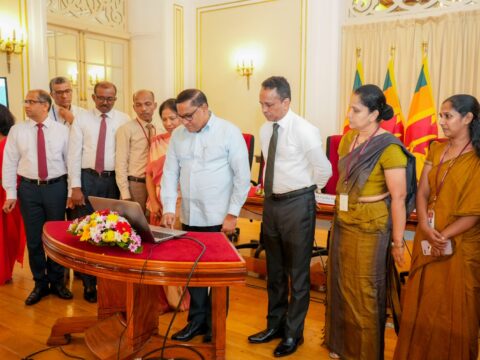COLOMBO: As the world welcomed a new year, President Anura Kumara Dissanayake marked the occasion by launching the ‘Clean Sri Lanka’ project, a comprehensive initiative aimed at transforming the nation and making a decisive shift in the country’s approach to governance and development. The initiative comes as Sri Lanka emerges from recent economic turbulence, with the President emphasizing the need for fundamental changes in political culture, economic structure, and social values.
The event held at the Presidential Secretariat was attended by members of the Maha Sangha, religious leaders, ministers, ambassadors, athletes, representatives from various sectors, and government officials. Donors also made donations to the ‘‘Clean Sri Lanka’’ initiative.
Dissanayake started his address by challenging the nation’s practices, offering a stern critique of nepotism, power misuse, and the creation of a political elite. He posed a question, “Despite decades of similar beginnings, have we truly embraced renewal for the betterment of our nation?” vowing that 2025 marks the start of a new political culture in Sri Lanka.
Economic Recovery and Structural Reforms
Outlining his vison for the transformative initiative, the President highlighted significant economic progress, noting that Sri Lanka officially emerged from bankruptcy in late 2024. “Over the past year, we achieved some stability on the surface level of the economy,” he stated, crediting the Ministry of Finance, Central Bank, and political leadership for this achievement. However, he emphasized that surface-level stability is insufficient, announcing plans to implement a comprehensive economic policy framework to address deeper structural issues.
Security and Rule of Law
President Dissanayake expressed confidence in the country’s robust and secure national defense, citing the police, intelligence services, and armed forces’ decisive actions in maintaining public trust. He also highlighted the significance of reinstating the rule of law, which had been neglected for far too long.
Our country has also faced various security threats over the years. It is with great confidence that we can now assure our citizens of a robust and secure national defence. Last year, reports surfaced regarding a potential attack cantered on Arugam Bay. Our police, intelligence services, and armed forces acted decisively to maintain the nation’s security and instil public trust. We have also begun systematically reinstating the rule of law, which had been neglected for far too long. In the past, criminals, corrupt individuals, and even political authorities operated above the law, disregarding constitutional principles. In some instances, former presidents were found guilty of constitutional violations by the Supreme Court. In such a context, the rule of law had become merely an abstract notion.
To re-establish and strengthen the rule of law, we are making significant efforts. Our country has been plagued by widespread corruption, malpractice, and inefficiency within the state apparatus, political institutions, and society as a whole. Corruption has become a malignant cancer spreading throughout our nation, and eliminating it requires a tremendous collective effort. The Attorney General’s Department has a critical role to play in this endeavour, and I trust they will perform their duties with the necessary diligence and support.
Similarly, institutions such as the Criminal Investigation Department and the judiciary bear the principal responsibility for transforming our country into one free from corruption and fraud. We believe these institutions will act with the dedication required to achieve this transformation. As political leaders, we are committed to setting an example through both our words and actions.
Three Pillars of Progress
The government’s strategy rests on three key objectives:
- National Economic Recovery with focus on rural communities
- Digital Transformation Initiative
- ‘Clean Sri Lanka’ Project
Environmental Challenges and Conservation
The President drew attention to pressing environmental concerns, citing alarming statistics: “In 2023 alone, 181 people lost their lives in human-elephant conflicts, and 484 elephants were killed by human action.” This highlighted the urgent need for environmental protection within the ‘Clean Sri Lanka’ framework.
Public Safety and Social Values
A significant portion of the address focused on public safety concerns, with the President revealing troubling statistics about preventable deaths. “On average, approximately seven people lose their lives daily due to road accidents in our country,” he noted, emphasizing the need for a new social value system that prioritizes human life.
Voluntary Leadership and Expert Engagement
The initiative has garnered support from distinguished professionals who are serving without compensation. The President highlighted that key institutions, including Sri Lankan Airlines, Sri Lanka Telecom, and the Port City, are now led by volunteers with exceptional expertise. “These individuals have stepped into their roles within our institutions to serve voluntarily, without any personal financial gain,” he emphasized.
Implementation Framework
To execute the ‘Clean Sri Lanka’ initiative, the government has established:
- A specialized task force of 18 members
- Plans for a ‘Clean Sri Lanka’ Secretariat
- Proposed ‘Clean Sri Lanka’ Council
- A dedicated fund with Ministry of Finance oversight
Looking Forward
President Dissanayake stressed that ‘Clean Sri Lanka’ is not a time-bound project but rather a continuous program designed to evolve with global circumstances. “This is not a one or two-year project,” he explained, describing it as part of a broader effort to restore governance within society.
Call for Collective Action
The President concluded with a powerful call for unity and participation, stating, “If the people are never ready to rise together, we will never have the chance to overcome these challenges.” He emphasized that the success of ‘Clean Sri Lanka’ depends on active citizen participation rather than merely governmental intervention.
The comprehensive initiative represents a significant departure from traditional approaches to national development, combining environmental conservation, social reform, and economic restructuring under a single unified program. As Sri Lanka enters 2025, the ‘Clean Sri Lanka’ project stands as a testament to the government’scommitment to transformative change and sustainable development.




